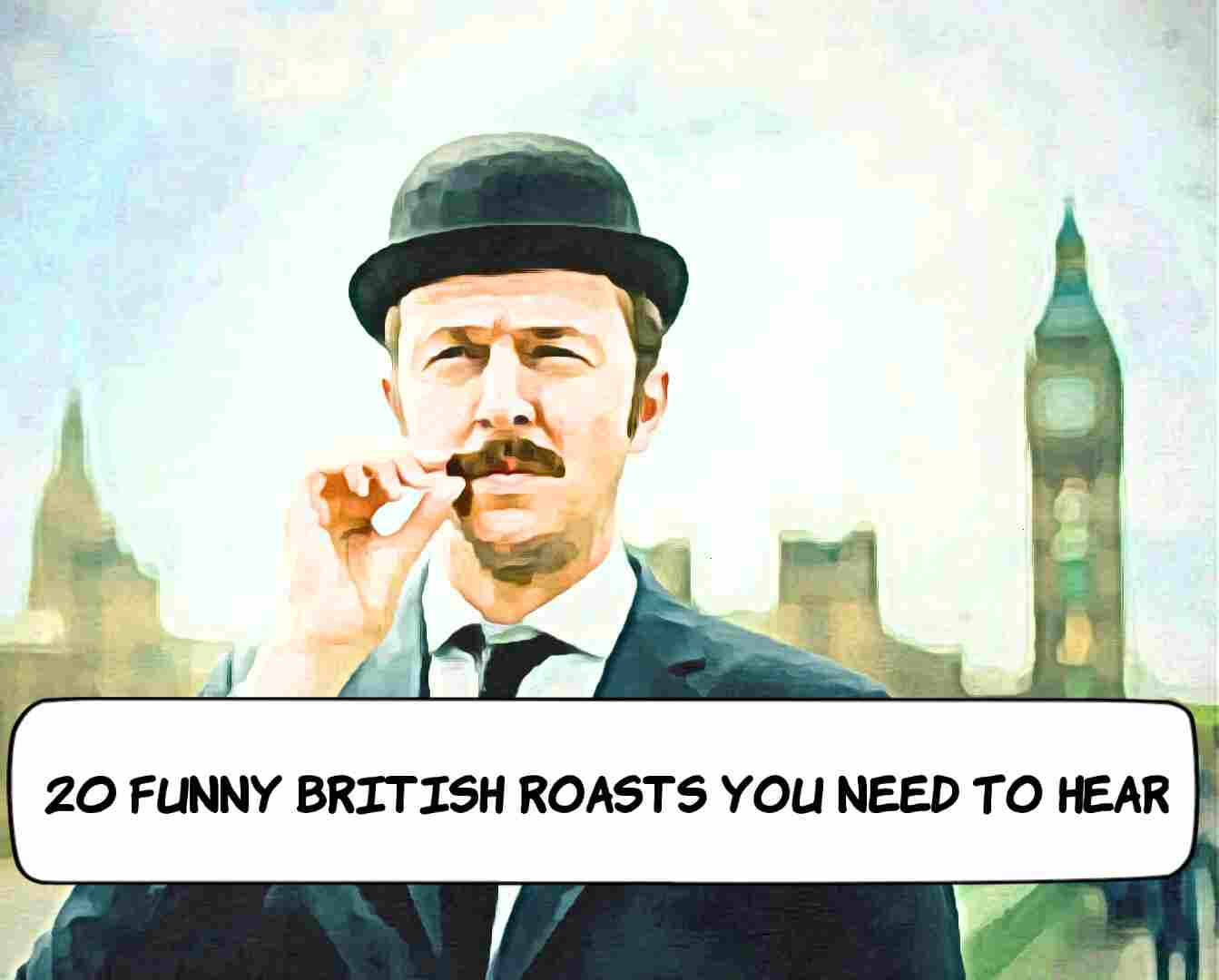The Brits are known for their slang, and they don’t disappoint when it comes to roasting someone.
It’s pretty interesting to hear this expression in sitcoms and comedy shows, but what’s more interesting is trying to incorporate these expressions into your everyday life.
In this article, I will show you 20 different funny roast punchlines that will make you sound British. You will also learn various ways to use these roast lines and the different situations where they work best.
List of 20 Funny Roasts the British Use
Keep in mind that some of these expressions are not always dictionary translations of words but rather a Brit’s take on them. The key is to know how to say them and in what situation to use them.
1. “You’re Such A Twit”

The word “twit” adds a unique British flavour – it’s not too mean, more like a light tease. Cambridge Dictionary defines “twit” as someone you think is stupid or fooling.
It’s similar to calling someone a bit silly in a playful way.
- “You’re acting daft, mate!”
- “Oh, you’re a bit of a goof, aren’t you?”
2. “You’re not the brightest bulb in the chandelier, are you?”
This is the Brit’s way of saying you’re not the most intelligent person in the room. It’s a clever and classy way of poking fun at someone’s smarts with a touch of humour.
I like this quintessentially British roast. Instead of just saying they’re not very smart, you compare them to the bulbs in the chandelier.
- “You’re not the sharpest tool in the shed, are you?”
- “You’re not exactly a genius, are you?”
3. “It’s a shame stupidity isn’t painful.”
The British are known for their clever humour, and this line is no exception. It suggests that if being stupid actually hurt, maybe people would think twice before saying or doing silly things.
The words are chosen carefully, making it a bit like a fancy insult.
So, you can use this line as a playful jab at the idea that if stupidity caused a bit of discomfort, the world might be a brighter place.
So, it’s not just a roast; it’s a clever and charming way of saying, “Hey, maybe we’d all be a bit smarter if being silly hurt a little!”
- “If only being silly came with a headache!”
- “It’d be great if doing dumb stuff made your elbow tingle.”
4. “I’ve seen more life in a trifle than in your eyes.”
It’s not just calling someone dull—it’s using a dessert to say, “Hey, your eyes are as lively as a snooze button.”
The exciting thing about the British is that they cleverly mix humour and a bit of cheekiness, turning a simple comment into a tasty little jab.
Similarly, this line is a witty and playful way of telling someone they’re a bit on the dull side, all wrapped up in the charm of a good-natured roast.
- “Your eyes are quieter than a library on a Sunday.”
- “I’ve found more excitement in a cup of tea than in your gaze.”
5. “You’re a few sandwiches short of a picnic, aren’t you?”

Use this line as a funny way of gently poking fun at someone’s intelligence, using the picnic setting to make it playful.
The charm comes from the clever mix of a pleasant picnic scene and the teasing remark. It’s one of the witty ways the British use to make fun of someone’s smarts.
- “You’re not the sharpest tool in the shed, are you? More like missing a few screws!”
6. “Were you raised in a barn?”
If you want to roast someone who seems to lack good manners, this is the best British way to say it.
British humour often relies on subtle sarcasm and understatement, and this line is no exception.
By playfully questioning someone’s upbringing in a barn, it implies that their behaviour is so uncivilised that it’s as if they weren’t taught proper manners.
It’s a humorous way of pointing out someone’s social clumsiness while maintaining a level of charm.
7. “You’re not the brightest bulb in the box.”
Imitate the subtle humour of the Brits by using this line as a polite way of saying someone might need a bit more brainpower.
Rather than being harsh, it’s a light tease, like sharing a friendly joke. It’s as if they’re saying, “Hey, maybe you’re not a genius, but that’s okay, we all have our moments.”
- “You’re not the smartest cookie in the jar.”
8. “Shut Your Laughing Gear”
“Shut your laughing gear” is a classic British way of telling someone to shut up.
This kind of teasing reflects the British style of humour, which often involves being witty and a bit cheeky without being too harsh.
So, you can always use this friendly nudge to tell someone to stop laughing or talking.
- “Zip it, funny face!”
- “Okay, chuckles, button it up!”
9. “I’ve met smarter sandwiches.”

The key here is that it’s a bit silly and over-the-top. Saying you’ve met sandwiches smarter than someone doesn’t make literal sense, but that’s the point.
It’s all about making a playful joke and not taking things too seriously because, in British humour, people often make fun of themselves or others in a light-hearted way.
It’s a classic example of how Brits use clever and absurd humour to poke fun at each other.
- “I’ve had smarter conversations with teabags.”
- “I’ve seen more intelligence in a doorknob.”
10. “You’re one taco short of a fiesta.”
This is a clever way of saying someone is a bit lacking in the smarts department. Tacos are lively and spicy, symbolising cleverness and insight here.
The British love their subtlety, and this phrase is like a polite but sassy way of saying, “You’re not quite getting the whole picture, are you?”
- “You’re not playing with a full deck of cards.”
- “You’re a bit short on brainpower, like missing a puzzle piece.”
11. “Are you off your trolley?”
This is Brit’s playful way of asking if someone has lost their mind. What makes it uniquely British is the casual, everyday element – referencing a shopping cart, of all things.
It’s a clever use of language, turning something ordinary into a witty jab.
- “Have you lost your marbles?”
- “Are you out of your mind?”
12. “What A Numpty”
“What a numpty!” is like saying, “Wow, what a goofball!” in a British way. Think of a person trying to juggle teacups and failing miserably – that’s a classic numpty move.
The word itself, a mix of “numb” and “empty,” perfectly captures the idea of someone being a bit clueless.
- “Oh, what a goof!”
- “What a silly goose!”
13. “Why do I feel I’m talking to a sleeping cat.”
Imagine trying to have a meaningful conversation with someone who just doesn’t get it, as if you were talking to a brick wall.
The phrase “It’s like talking to a brick wall” is a British way of playfully saying that the other person isn’t paying attention or isn’t very responsive.
The classic example of British wit is where they use understatement and a touch of exaggeration to make a point.
- “It’s like talking to a sleeping cat.”
- “It’s like explaining colours to a robot.”
14. “You’re as daft as a brush.”
Firstly, “daft” means a bit silly, right? So, they’re saying you’ve got a touch of foolishness about you.
Now, imagine a brush, just a plain ol’ cleaning tool. Nothing fancy, right? Exactly!
By comparing you to a meeting, they’re basically saying your silliness has reached a level even a simple meeting would find over the top.
This kind of roast is typical British humour – sharp, cheeky, and oh-so-clever.
- “You’re as silly as a goose in a hat.”
- “You’re as goofy as a banana in sunglasses.”
15. “You’re not the full shilling, are you?”
The phrase “the full shilling” refers to a complete, undamaged unit of currency, like a coin. So, saying someone isn’t the full shilling implies they’re a bit off, not quite right.
The beauty of this British roast lies in its clever use of words. It’s a gentle teasing, delivered with a smile, implying that there might be a screw loose somewhere.
16. “You’re a few peas short of a pod.”
It means that someone is a bit quirky or not thinking quite like everyone else. Unlike Americans, the British are known for being subtle and not too harsh with their jokes.
So, this line is more like a gentle tease, not meant to be mean.
So, if someone says this to you, just smile, enjoy the banter, and maybe even join in with your witty comeback!
- “You’re a sandwich short of a picnic.”
17. “The wheel is turning, but the hamster is dead.”
When someone says, “The wheel is turning, but the hamster is dead,” it’s like saying life is going on and things are happening, but it might all be a bit pointless or futile.
I’ve heard this phrase in many British comedy shows.
British humour often finds a funny side in the everyday struggles or ironies of life, and this phrase is a prime example of that clever and slightly sarcastic style.
- “The clock is ticking, but the batteries are dead.”
18. “I don’t consider anything coming from a Cockwomble as you.”
Now, ‘Cockwomble’ is not your everyday insult. According to Urban Dictionary, Cockwomble means idiot, foolish, obnoxious.
The line doesn’t just diss the person; it disses everything connected to them. It’s like saying, “Your ideas are so bad that just being linked to you makes them worthless.”
It’s a fancy way of saying, “You and anything related to you are not even worth considering.” It’s British wit at its best—fancy words, a sprinkle of humour, and a whole lot of sass.
- “Your thoughts are like a recipe from a cookbook written by a silly goose—I’m not even taking a bite.”
19. “When will you realise that you’ve lost the plot?”
This roast line is the British way of saying, “Dude, you’re completely out of touch and clueless.”
- “Mate, have you checked the script lately? Seems like you’ve misplaced the plot.”
- “You’re going crazy, man.”
20. “You’re a complete plonker, mate.”
“Plonker” is a playful way of saying someone’s a bit silly or acting foolish. It’s not super serious; it’s more like good-natured teasing.
It’s not a harsh insult; it’s more like a shared joke between friends.
The Brits have this witty way of roasting each other, and “You’re a complete plonker, mate” is a prime example – a lighthearted jab that keeps the laughter flowing.
- “You’re acting a bit daft, buddy.”
- “You’re a total goof, pal.”
What other British roasts have you heard and you think would make this list? Feel free to share in the comments.

Leave a Reply